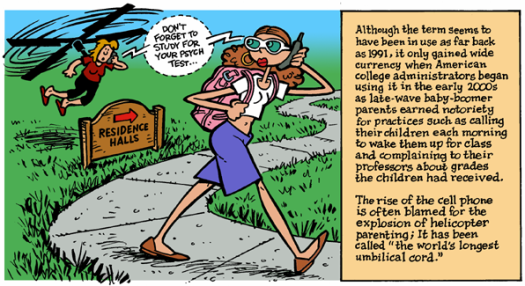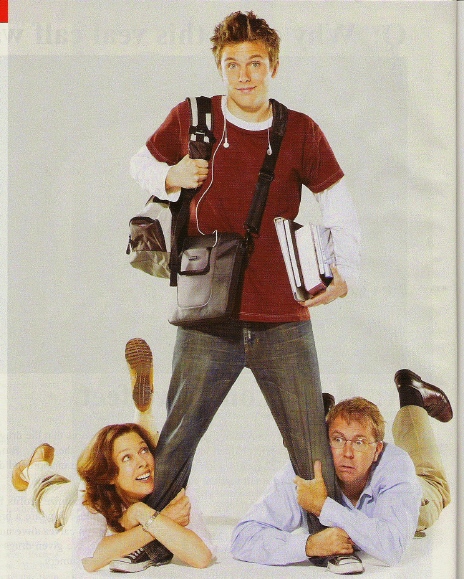“Helicopter Parenting”: The Ultimate Over-Protection
I first heard the term “helicopter parent” on some news broadcast. I started my search, as I do with all new concepts, with Wikipedia. Despite or perhaps because of its imperfections, I have come to rely on Wikipedia as my first line on what people think and do.
These are the folks who originated the name tag, and sell the products that are supposed to help fix the problem.
I am not a parent and not a parenting expert. I am certainly expert enough in adult psychiatry to be able to figure out something about this problem.
It is not an individual parenting problem. It is a global problem, and a real problem, and it is starting to cause problems in sectors far removed from home parenting.
The picture on “why teachers drink” is an explanation only those who know about the problem seem to understand.
They seem to call it “curling parenthood” in Scandinavia. If anyone has ever seen curling except for people like me who have visited icy northern Europe and Scotland, it is a highly civilized sport where someone sweeps the space in front of a large round (calibrated) stone sliding on the ice, in order to make it go quicker and farther and get it to a certain place. This is a wild way of describing smoothing someone’s path. Helping children to not have any problems, presumably retarding their development.
The signs include parental pressure and presence in places that have been previously considered the realm of “adult” decision making.
Parents are reported to be intervening regularly in teachers grading their children, even in college or graduate school. They are intervening in later job acquisition, even in salary negotiation, for their children. They search dorm rooms, try to control the socialization of their children as closely as they can. Financially dependent children do not even think of fighting.
I remember way back, from the study of comparative vertebrate zoology, that humans spend longer preparing adults of their species.
I have heard that college is a prolongation of infancy.
My mother loved the riddle “When does an embryo become viable away from Mom’s body?” The answer is, “after it finishes medical school.”
I struggled with some basic overprotective issues with my own parents.
I fought for things I wanted to do, like go to a special science training program in the summer when I was 15 and the youngest there, and had already decided I needed to do something in the sciences.
Luckily, my father and I laughed our head off when at age 40, when I brought home my husband, my mother told him to hold my hand when we crossed the street (which admittedly blended into an expressway offramp) as she had always considered it a blind and “dangerous” street which I should not be permitted to cross alone.
When my brother was in all kinds of useless therapy, and I asked to talk to the therapist, the point was made to me that it was better to deal with overprotective parents than with people who had lost, abandoned, or kicked out their children. I let him by. It was not a major point then.
It should have been, for later, on the death of my mother, my husband and I inherited the difficult care of my brother of blessed memory.
My parents, mostly my mother, had managed to “infantilize” him. It was like having a (by that time) 44 year old child who could do nothing for himself.
I could find no mainstream psychologic literature on this one. My brother had clear psychopathology (Asperger’s). Now, we have a global social issue, so there will be bewilderment and later clinical description and maybe some putative treatment. This seems to take a very long time.
At least, I could find one open subjective story.
In her case, she describes herself as “unready” for the world and from her description, she was.
She also describes a depression with panic attacks. God only knows if she had a genetic history of related illnesses, but she credits this form of upbringing with being the genesis of her own psychopathology.
I do not think that she is wrong.
Overprotectiveness does indeed produce people who are not experienced enough in handling day to day situations to deal in an appropriate manner with the outside world.
Overprotective parenting has certainly occasioned a lot of the problems I see in my private office or clinics. I believe it has been a causative factor in at least a half dozen other cases of panic attack known to me.
I am not even going to talk about when parenting becomes torture; grounding and putting in closets are not so far away.
I once treated the child of a father who thought children should be “beat up once in a while” for no reason, so they knew what the world was like.
He was pretty messed up.
Why would parents do this?
In the past, parents, such as mine, and even grandparents, could predict a better life for their children than generations past had seen.
With the current economic state of the world, nobody can do this.
Parents who think, often educated, at least literate, worry about what kind of life their children will have when they grow up.
They cannot control outside influences.
I can see how they would want to.
I can see why they believe the more they do, the better things get.
Soon they will learn the consequences of their acts.
At one time in my life, I thought it would be better if people had to take out a license before having a child.
Now I know there is nobody I would trust to do the licensing.
Parenting is one of the few jobs that, if done correctly, it renders the worker useless.
“Helicopter parenting” is incorrect.
Filed under Family by on Dec 14th, 2009. ![]()


Leave a Comment